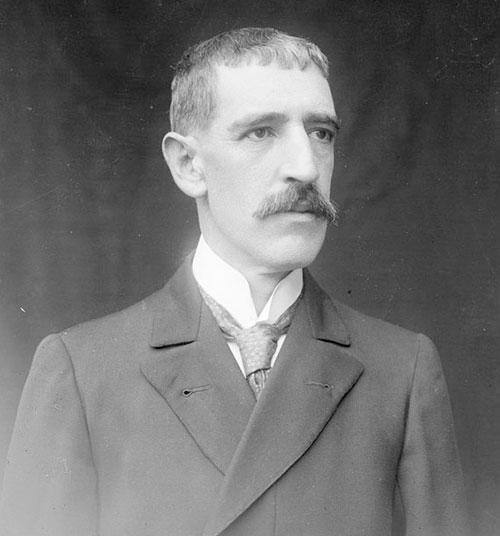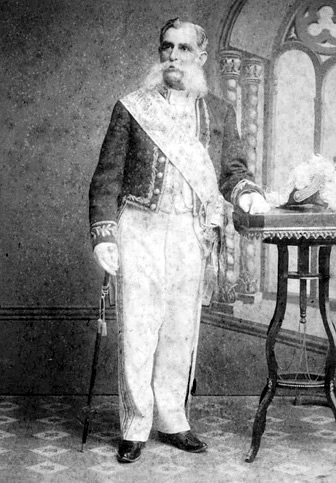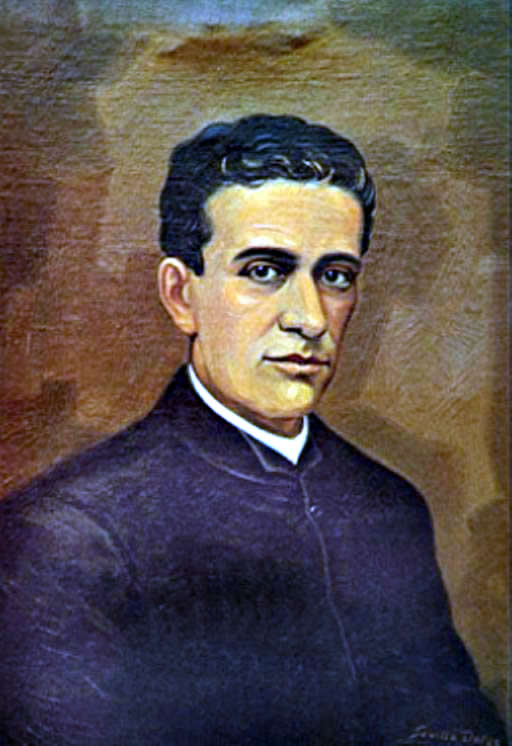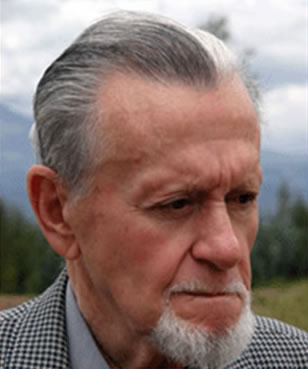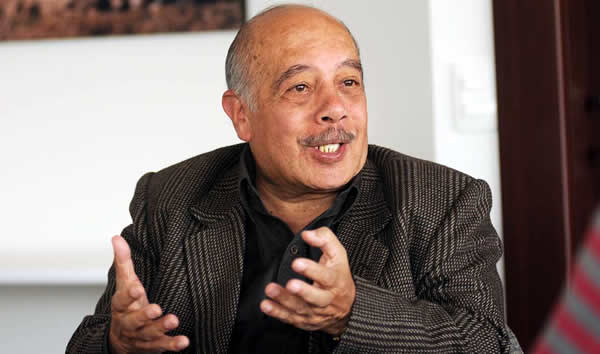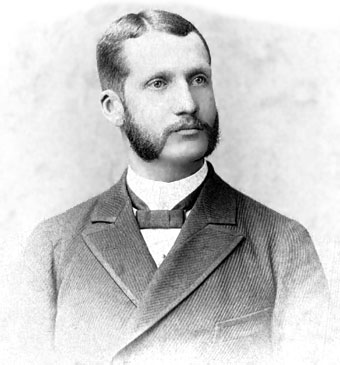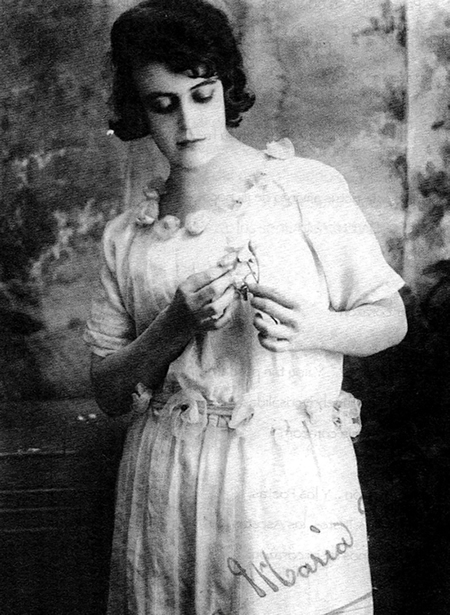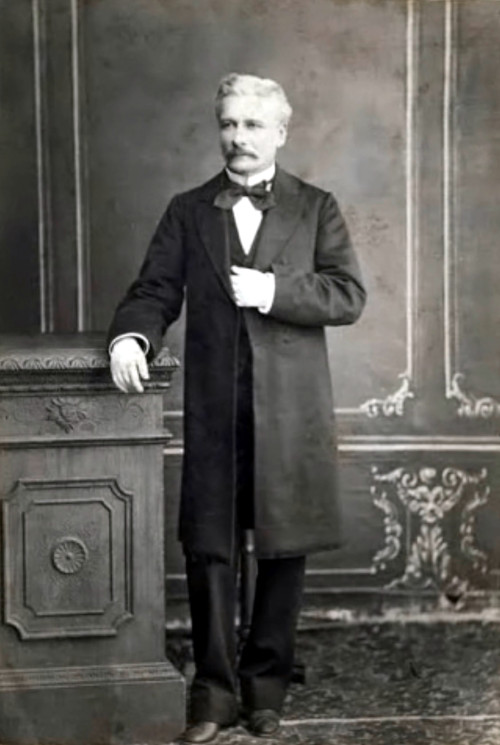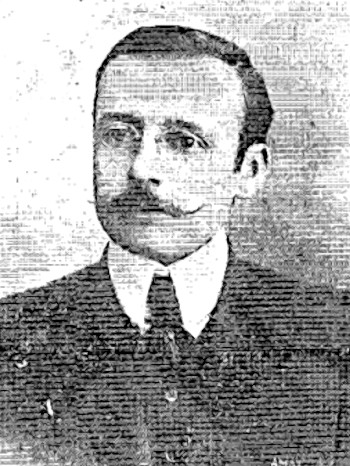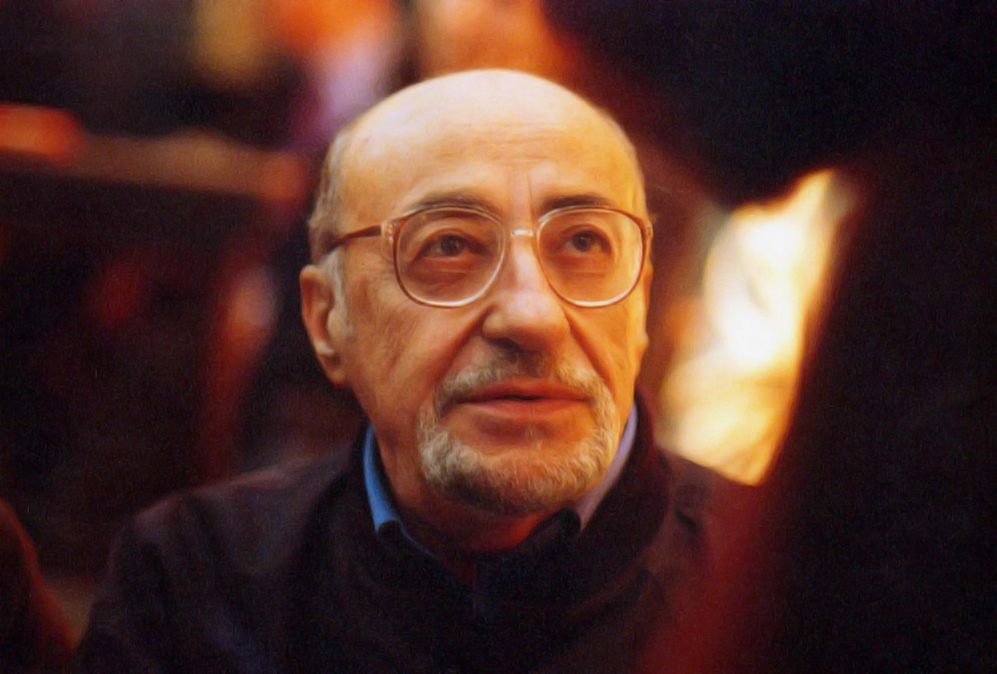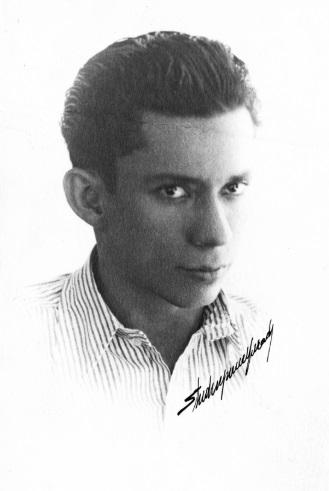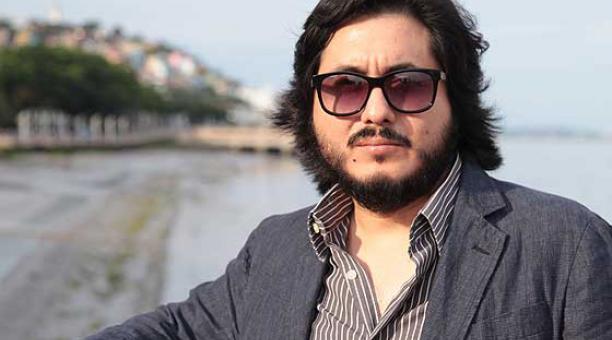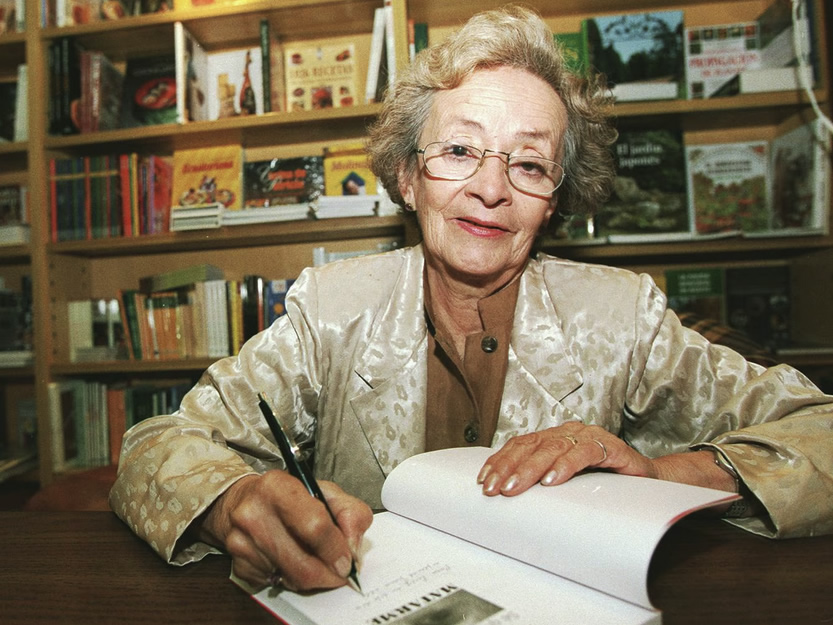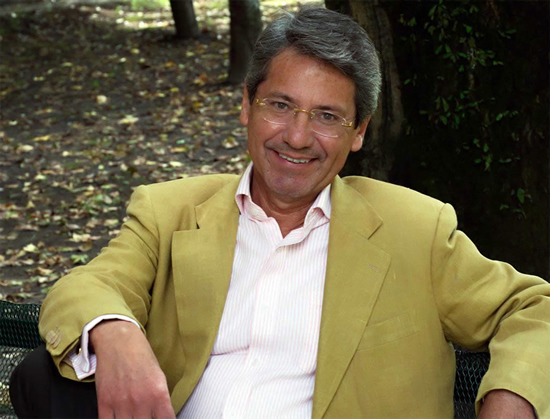Octavio Cordero Palacios (Santa Rosa, Azuay, May 3, 1870 – December 17, 1930) was a writer, playwright, poet, lawyer, judge, politician, mathematician, translator, teacher and inventor. Among his plays are Gazul (1890), Los Hijos de Atahualpa (1891) and Los Borrachos (1892). Today the town in which he was born bears his name.
Continue reading “Octavio Cordero Palacios”Category: Poets
Luis Cordero Crespo
Luis Benjamín Cordero Crespo (Cañar, April 6, 1833 – Cuenca, January 30, 1912) served as the 14th president of Ecuador between July 1, 1892 to April 16, 1895. Cordero began publishing poetry in Spanish and Quechua after his political and legal career, and in 1892 published the first Quicha-Spanish dictionary. In 1904 he wrote the Hymn of Azuay (also referred to as the Hymn of Cuenca) which is still in use today.
Continue reading “Luis Cordero Crespo”Juan Bautista de Aguirre
Father Juan Bautista de Aguirre y Carbo (Daule, Ecuador, April 11, 1725 – Tivoli, Italy, June 15, 1786) was a writer, poet, philisopher, theologian and Jesuit priest from colonial South America. Aguirre wrote poems of varying topics, including religious, moral, and love poems. Aguirre taught in Quito at the San Gregorio Magno University until the Jesuits were expelled from Spanish America in 1767. On August 20 of that year he left South America from Guayaquil bound for Faenza, Italy, where the Jesuits of Quito had taken refuge. Once in Italy, Aguirre was the superior of the Jesuit convent school in Ravenna and rector of the college in Ferrara. After the Order of the Jesuits was terminated by Pope Clement XIV in 1773, he settled in Rome under the papacy of Pope Pius VI. He was a friend of the bishop of Tivoli, Monsignor Gregorio Bamaba Chiaramonti, future Pope Pius VII.
Continue reading “Juan Bautista de Aguirre”Filoteo Samaniego
Filoteo Samaniego Salazar was an Ecuadorian poet, novelist, translator, historian and diplomat. He was born in Quito on July 11, 1928 and died in the same city on February 21, 2013. Since 1984 he was a member of the Ecuadorian Academy of Language, and was its secretary from 1996–2006. Samaniego’s diplomatic career began in 1949 as the chief of staff of Ecuador’s Ministry of Foreign Affairs. He served as Ecuador’s Ambassador to Germany, Egypt, Austria and Romania. Among his translations is Cronica, 1961, (originally Chronique, 1960), by the French Nobel laureate Saint-John Perse. Among Samaniegos’ most popular poetry books are Agraz (1956), Relente (1958) and Umiña (1960), and he is the author of the novel Sobre sismos y otros miedos (1991). In 2001 he was awarded Ecuador’s top literary prize, the Eugenio Espejo Award.
Continue reading “Filoteo Samaniego”Humberto Vinueza
Humberto Vinueza Rodríguez was a writer and politician. He was born in Guayaquil in 1942 and died in Quito on March 15, 2017. During his lifetime, we published around 15 books, which earned him prestigious prizes such as the José Lezama Lima Prize (Cuba) and the Jorge Carrera Andrade Prize (Ecuador). He was part of the Tzantzismo literary movement of the 1960s Ecuador. In 1970 he published the book Un Gallinazo Cantor Bajo un sol de a perro. This book has been called a fundamental part of Ecuadorian poetry by writers such as Jorge Dávila Vázquez and Abdón Ubidia.
Continue reading “Humberto Vinueza”Magaly Vanégas Coveña
Magaly Vanégas Coveña (Cuenca, 1953) is an Ecuadorian poet, short story writer, journalist, philologist and teacher. Following her studies at the University of Cuenca, she received a scholarship to study at the Pushkin State Russian Language Institute in the former Soviet Union, as well as at the Faculty of History and Philology at Moscow University. She has taught Spanish at Moscow University and Russian at Cuenca’s Ecuadorian-Soviet Cultural Institute. She is currently a teacher at the Manuel J. Calle National School in Cuenca. She is a member of the Ibero-American Poetry Academy in Cuenca. Her poems are known for their short verses and themes of absence, loneliness, nostalgia, and simple things in nature, for example: “A bird / has hung its nest / in the shadow / of a balcony” (from Espejos de la imaginación, 2000).
Continue reading “Magaly Vanégas Coveña”Remigio Crespo Toral
Remigio Crespo Toral was an Ecuadorian poet and writer. He was born in Cuenca on August 4, 1860 and died In the same city on July 8, 1939. In 1905, President Leónidas Plaza Gutiérrez appointed him lawyer of the Republic, to defend Ecuador in its diplomatic conflict with Peru. In 1909, in the centennial of the first cry of independence, Crespo Toral published a book titled Cien años de emancipación. In 1917, he was crowned national poet, by decree of the President Alfredo Baquerizo Moreno, in the Central Park of Cuenca. This was a very important ceremony, which was attended by the entire city, including senior officials like President Baquerizo Moreno, the Ambassadors of the United States, Belgium, Chile, Peru, among others. In 1925, he was appointed Rector of the University of Cuenca, holding this post until his death.
Continue reading “Remigio Crespo Toral”Mary Corylé
María Ramona Cordero y León (pen name Mary Corylé) was an Ecuadorian poet, journalist, playwright, researcher and teacher. She was born in Cuenca on May 21, 1894 and died in the same city on May 7, 1976. She wrote many poems, lyrics for hymns and pasillos (traditional music of Ecuador), and also wrote plays. Among her many accomplishments, she founded the Municipal Library of Cuenca. Before her death, she donated all her works to the Remigio Crespo Toral Museum in Cuenca. Among Corylé‘s most famous poems is Bésame (1925), which critics consider one of the most erotic Ecuadorian poems of the early 2oth century.
Continue reading “Mary Corylé”Numa Pompilio Llona
Numa Pompilio Llona (Guayaquil, March 5, 1832 – April 5, 1907) was an Ecuadorian poet, lawyer, journalist, educator, diplomat, and philosopher. He served as a diplomat abroad, in countries such as Spain, France, Italy and Colombia, during which time he formed friendships with famous authors such as Victor Hugo, George Sand and Alphonse de Lamartine. He served as the rector of the University of Guayaquil, and also as the director of the Municipal Museum and Library of Guayaquil. During his lifetime he was one of Ecuador’s most popular poets.
Continue reading “Numa Pompilio Llona”Joaquín Gallegos Del Campo
Joaquín Gallegos Del Campo was an Ecuadorian modernist poet, newspaper publisher, and liberal politician. He was the father of the legendary author Joaquín Gallegos Lara. He was born in Guayaquil, Ecuador on July 27, 1873. In 1894, he and his brother Emilio founded the liberal weekly newspaper El Cáustico. In 1896, he founded another liberal newspaper, América Modernista, which published many modernist poets of the era. On November, 20, 1910, while serving as Secretary-General of the Government of El Oro Province, he was killed by a stray bullet during a revolutionary riot gunfight when he looked out his office window from the government building to see what was happening. At the time of his death his only son was less than 2 years old. In 1912, his only book Mis recuerdos: poesías líricas y cuentos en prosa was published posthumously by his window Emma Lara Calderón.
Continue reading “Joaquín Gallegos Del Campo”Jorge Enrique Adoum
Jorge Enrique Adoum, or Jorgenrique Adoum (Ambato, June 29, 1926 – Quito, July 3, 2009) was an Ecuadorian poet, novelist and playwright. Adoum is best known for his poetry collections and his celebrated novel Entre Marx y una mujer desnuda (1976). He is regarded as one of Ecuador’s most important writers and intellectuals of the 20th century. Nobel Prize winner Pablo Neruda hailed Adoum as “the best Latin American poet of his generation.” An English translation of Adoum’s poetry was published by Katherine M. Hedeen and Víctor Rodríguez Núñez under the title “prepoems in postspanish and other poems” (Action Books, 2021). This collection includes three of Adoum’s most groundbreaking books: “Currículum mortis” [Curriculum Mortis] (1973, 1979), “prepoemas en postespañol” [prepoems in postspanish] (1973, 1979), and “El amor desenterrado” [Love Disinterred] (1993). In 1989 the President of Ecuador conferred on Adoum Ecuador’s highest literary prize, the Eugenio Espejo Award, for his lifetime of literary work.
Continue reading “Jorge Enrique Adoum”Joaquín Gallegos Lara
Joaquín Gallegos Lara (Guayaquil, April 9, 1909 – Ibidem, November 16, 1947) was an Ecuadorian novelist, short story writer, poet, and literary critic. His works often reflected the social and political issues of his time, including poverty, inequality, and injustice. He was a member of the Communist Party of Ecuador and was imprisoned many times for his political convictions. Lara was born with Pott’s Disease, a rare spinal disease which caused paralysis in his legs. Due to his inability to walk, he was unable to attend school and instead devoted himself to self-study at home, in which time he mastered the French, German, Italian, and Russian languages. He was a member of the “Guayaquil Group,” and has been described as the group’s spiritual leader. The book of short stories “Los Que Se Van” [Those Who Leave] (1930), co-authored with Demetrio Aguilera Malta and Enrique Gil Gilbert, marked the beginning of literary social realism in Ecuador. His most famous novel, “Las cruces sobre el agua” [Crosses on the Water] (1946), is concerned with the November 15, 1922 massacre of striking workers in Guayaquil. Despite his brief life, Joaquín Gallegos Lara’s works are still widely read and continue to be studied and recognized for their profound impact on Ecuadorian literature.
Continue reading “Joaquín Gallegos Lara”Ernesto Carrión
Ernesto Javier Carrión Castro (Guayaquil, 1977) is a distinguished poet and novelist whose work has won numerous awards and has been widely recognized both in his home country and internationally. His literary career began to gain momentum in 2002 when he was awarded the César Dávila Andrade National Poetry Prize for “Carni vale”. Over the years, Carrión Castro’s unique voice and innovative storytelling have earned him several prestigious awards such as the Jorge Carrera Andrade National Poetry Prize for “Viaje de Gorilas” in 2013, and the Casa de las Américas Novel Prize for “Incendiamos las yeguas en la madrugada” in 2017. His book “El día en que me faltes” won the Lipp Novel Prize in 2017. Most recently, in 2019, his novel “El vuelo de la tortuga” won the Miguel Donoso Pareja Prize. In 2023, Carrión Castro’s continuous contribution to literature was recognized with the Gonzalo Rojas Residency Scholarship. His ability to weave compelling narratives with poetic language has solidified his status as one of the most significant contemporary writers in Latin America.
Continue reading “Ernesto Carrión”Alicia Yánez Cossío
Alicia Yánez Cossío (Quito, September 10, 1928) is an Ecuadorian novelist, poet, short story writer, and journalist. She is considered one of the 2oth Century’s most important literary figures of Ecuador and Latin America. Since 1991 she has been a member of the Ecuadorian Academy of Language. In 1996, with her novel El cristo feo (1995), Yánez became the first Ecuadorian to win the Sor Juana Inés de la Cruz Prize (Guadalajara, Mexico), one of the most prestigious awards for female authors in the Spanish speaking world. In 2008 she received Ecuador’s highest literary award, the Eugenio Espejo Award, for her lifetime of work.
Continue reading “Alicia Yánez Cossío”Raúl Vallejo
Raúl Vallejo, born César Raúl Enrique Vallejo Corral (Manta, June 28, 1959) is an Ecuadorian novelist, short story writer, poet, politician and academic. He has served as the Minister of Education in the administrations of presidents Rodrigo Borja Cevallos, Alfredo Palacio and Rafael Correa, who also named him Minister of Culture and Patrimony. In the realm of literature, he is one of today’s most prolific writers, and has won many national and international awards, such as the Royal Spanish Academy Award (Spain), José Lezama Lima Poetry Prize (Cuba). In 1999 his books Huellas de amor eterno (short stories) won the Aurelio Espinosa Pólit Prize and Acoso Textual (a novel) won his second Joaquín Gallegos Lara Prize.
Continue reading “Raúl Vallejo”
